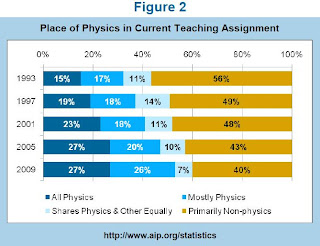(Disclaimer: Although I am a physicist, I am not a statistician, nor do I use a lot of statistics in my work. Someone like Nick or Joe would be able to pull a lot more information out of this data, and they would also likely be able to tell you the significance (if any) of my observations below. I, however, don't really know how to do that. I'm just making a list of observations as I see them from the posted data.)
First of all, the NCES reports on what teachers teach as compared to what level of degree they achieved. (I'm not going to reprint the table here. You can see it online for yourself.)
For 2007-2008, "Natural Science" teachers had a greater percentage of PhDs than any other specialty -- a full 3% of high school natural science teachers has a PhD. Social science teachers were the only ones who came close to that at 2.4%. Natural science teachers also are scored the highest on percentage of masters degrees -- 51.4%. So, over 60% of high school natural science teachers have a graduate degree (this includes "educations specialists"). (We compare this percentage to the overall average of 53.5%. The only other specialty that came close to this in terms of graduate degrees was special education at 59.9%.) Surprisingly, mathematics came in rather low at 52.6% having a graduate degree, with only 0.9% having a PhD. (Some may argue that this simply means that if you're going to get a PhD in math, you have better jobs open to you than teaching high school, but it is still interesting to note.)
It is also interesting to look at what their degrees were in. Also, from the NCES report, 83% of natural science teachers had a degree in the natural sciences. Other common degrees among natural science teachers were in secondary education and other education. There were also a significant number who had gotten their degrees in Health / P.E., Social Sciences, and Vocational / Technical. (I admit, by some sad and/or humorous experience that each of these make a lot of sense.) The only other specialties with a higher percentage of degrees within their field were Arts / Music, and Health / P.E. Only 67.3% of math teachers hold a math degree. About 10% of them hold a natural science degree and 13% hold a technical degree -- there were also many with education degrees.
Now, how have these trends been changing? For that, let's look at physics teachers specifically. From the AIP:

Natural science teachers in general, and physics teachers specifically, have always had a high level of graduate degrees, and that number has risen significantly over the last decade or two.

Also, we can see that physics teachers are teaching physics more exclusively. Over half of physics teachers teach mostly or all physics, and this percentage has been rising over the last decade or two.
One thing that is rather surprising is that less than half of physics teachers have a physics degree.

Given this, combined with the NCES data, one might surmise that even though most physics teachers don't have a physics degree, they almost certainly have a degree in a related natural science (like chemistry).
Also, about 2/3 of high school physics teachers have taught physics at least as much as any other subject.

Now, what conclusions do we draw from this? I'm not sure. (Cue the statisticians.) As far as general trends, it looks like physics teachers are generally well-trained, having some of the highest rates of graduate degrees and degrees related to their field of any high school teachers. Also, this level of training has been increasing in recent years.
Any thoughts on this? What qualifications would you look at in rating high school physics teachers? What factors would do you think may be driving the increase in physics training and specialization? Any other thoughts / refutations / comments / etc?
It is very refreshing to see that a both the numbers and fraction of physics teachers with physics degrees has been rising. I was lucky enough to have a high school physics teacher with a master's in physics which is in part why I am where I am today.
ReplyDelete